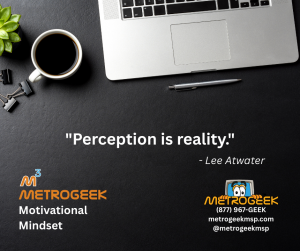 By Jack Parsons, Jr.
By Jack Parsons, Jr.
I’ve long been fascinated by a simple, yet profound question that has occupied philosophers for centuries: “If a tree falls in a forest and no one is around to hear it, does it make a sound?”
This isn’t just a riddle. It gets to the heart of the philosophical debate about perception vs. reality, a topic I first encountered years ago in a philosophy class. It's a debate that began with George Berkeley's idea that "to be is to be perceived" and was later explored by thinkers from Albert Einstein to Niels Bohr. Their discussions, particularly at the quantum level, questioned whether reality has definite properties before it is observed. For a long time, this was an abstract, academic debate.
Then, in the 1980s, the phrase took on a whole new, practical meaning in the world of politics and business. As the American political strategist Lee Atwater so succinctly put it, "Perception is reality."
This is the truth that every business owner, manager, and team member must confront. While we can all strive for an objective reality—to be the best IT firm, to have the most talented team, to provide the highest quality service—what truly matters to our clients and our peers is their perception of us.
At METROGEEK, I've always pushed for us to be polished and professional. I've worked to instill in my staff the importance of professional appearance and behavior. Why? Because I know that a potential client's first impression, their perception, is the foundation upon which their reality of our company is built.
The Unseen Influences on Our Reality
My journey with perception is not just academic; it’s deeply personal. Having lived with PTSD from military service and managed Type 2 Diabetes, I've come to understand how deeply our personal struggles can color our reality.
I haven't always been my best. My reactions have sometimes been shaped by things I didn't even realize were influencing me. These personal battles have, at times, led to misunderstandings and mistakes. I've had to apologize, learn, and consciously work to separate my internal reality from the objective facts of a situation. This journey has taught me profound lessons about empathy and self-awareness.
What We Perceive Is Our Reality
The truth is, your perception of a situation is shaped by your unique vantage point. As the writer C.S. Lewis once said, “What you see and what you hear depends a great deal on where you are standing. It also depends on what sort of person you are.”
This is especially true in our business. A client's perception of a slow computer might be based on a single program running in the background. My team's perception is that it's a simple fix. In that moment, both perceptions are real to the person experiencing them, even if the underlying facts are different. It's our job to understand their perception and align it with the true reality of the solution.
This is the power of the C.S. Lewis quote: it reminds us to have empathy and to see things from our clients' point of view.
The Power of Our Mindset
The motivational speaker Wayne Dyer added another layer to this idea: "If you change the way you look at things, the things you look at change."
This isn't just about how others see us; it's about how we see ourselves. If you perceive your business as struggling, you will find evidence to support that belief. If you perceive it as a resilient force laying the groundwork for future success, you will act in ways that make that a reality.
This is the core of our METROGEEK Motivational Mindset (M3) series. It's about recognizing that our internal perception of a challenge—whether it's a technical problem or a business struggle—is the first thing we must change before we can solve it.
Perception, Actuality, and The Truth
Many people, from political commentators to athletes, have weighed in on this topic. As former NFL quarterback Steve Young said, “If you are perceived to be something, you might as well be it because that's the truth in people's minds.”
This is a powerful and, frankly, a somewhat cynical take. It suggests that perception can override objective truth. But as we see with businesses that fail to live up to their reputation, the cracks in the facade eventually show.
This is where former football coach Bill Cowher's quote offers a critical distinction: “Perception is reality, but it may not be actuality, and you have got to be able to keep the difference between that.”
This is our job at METROGEEK. Our perception of professionalism is built on the actuality of our expertise, our promptness, and our dedication. We don't just want to be perceived as great; we want to have a great reality to back it up.
So yes, perception is a powerful force. But for a business to last, it must be more than just an image. It must be built on a foundation of solid, consistent, and provable reality.
Ultimately, your success depends not only on how others perceive you, but also on your ability to shape that perception by consistently delivering on your promises.



